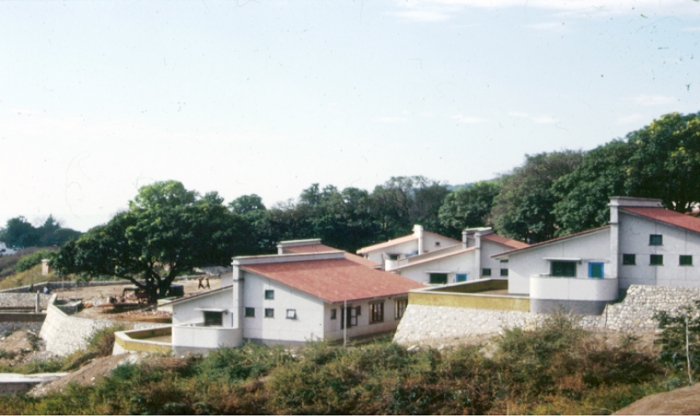“Green” buildings are constructed to integrate design techniques, materials, and technologies that reduce dependency on fossil fuels and other natural resources, thereby minimizing the negative impact on the environment.
Till about a decade ago, all indications of eco-design were not inherent in one single building or community either. A highly energy-efficient or a water-efficient home could get away with being labelled ‘green’. Today, however, a green building needs to acknowledge and take into consideration all facets of environmental concerns - location, water and energy usage, and materials used during construction.
We rounded up seven such feats in sustainable architecture across the country, that modern architects and designers must learn from!
1. Degree College and Hill Council Complex (Leh, Ladakh)- Arvind Kishan and Kunal Jain
This is a “zero energy consuming” building during daytime, the normal hours of operation. All the buildings on the north side of the complex have been designed to minimize heat loss, while in the south have been designed to maximize heating and daylight distribution.

Source: www.re-thinkingthefuture.com
2. ITC Green Centre (Gurugram, Haryana)– RKA India
The structure was awarded the LEED platinum rating owing to the cost-effective green building techniques utilized, with the focus being on energy efficiency, water savings, and air quality. The design features AAC blocks, roof insulation, and double-glazed windows.

Source: pbs.twimg.com
3. First Baptist Church (Chandigarh)- Surinder Bahga
Cavity walls in the NE and SW Sections of the building are used to prevent heat gains, while the use of glass has been kept to a minimum and white-painted barrels vaults have been placed on the roof to maintain a comfortable temperature in the interiors during summer.

Source: static.zingyhomes.com
4. SOS Tibetan children’s village (Dehradun, Uttarakhand)– Ashok B Lal Architects
The concept is a simple low-cost, low- maintenance construction with the primary goal being protection from harsh winds and solar access. All the buildings are adjusted to the terrain and face south so no matter what the layout is, each structure receives ample winter sun.

Source: www.ashokblallarchitects.com
5. Sangath: An Architect’s Studio (Ahmedabad, Gujarat)- BV Doshi
The structure is buried under the ground for the most part to employ earth masses as a form of natural insulation. Rainwater and excess water from the tank on the roof are harnessed through roof channels that run through a number of cascading tanks and channels.

Source: cdnassets.hw.net
6. Pearl Academy of Fashion (Jaipur, Rajasthan)– Morphogenesis
The structure utilizes various passive climate control methods, indigenous to old houses in Rajasthan, such as open courtyards, water bodies, a step-well and jaalis. The outer wall sits four feet away from the building and reduces the direct heat gain through fenestrations.

Source: www.morphogenesis.org
7. The Druk White Lotus School (Shey, Ladakh)- Arup associates
Sustainability was the centre stone for this design due to the harsh, high altitude, desert environment where there is a scarcity of water. The toilets don’t require water as they have a passive technology that eliminates odours and turns waste into compost.

Source: fairconditioning.org
Historically, there have been a number of incredible manifestations of eco-consciousness in the design of several monuments, keeping the climate in mind. Making decisions that are environmentally mindful can tremendously decrease a community’s carbon footprint. The challenge today is to incorporate this approach into the mainstream design philosophy.
Want to learn more about incorporating sustainability in Architecture? Join our one-day masterclass and become an expert today!
